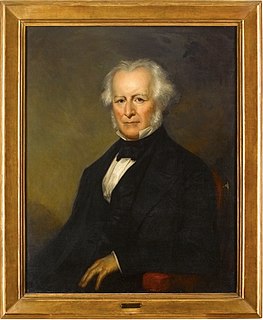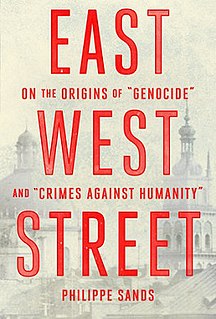Related Research Articles
Genocide is the attempted destruction of a people, usually defined as an ethnic, national, racial, or religious group. Raphael Lemkin coined the term in 1944, combining the Greek word γένος with the Latin suffix -caedo.
Cultural genocide or cultural cleansing is a concept which was proposed by lawyer Raphael Lemkin in 1944 as a component of genocide. Though the precise definition of cultural genocide remains contested, the Armenian Genocide Museum defines it as "acts and measures undertaken to destroy nations' or ethnic groups' culture through spiritual, national, and cultural destruction."
The Convention on the Prevention and Punishment of the Crime of Genocide (CPPCG), or Genocide Convention, is an international treaty that criminalizes genocide and obligates state parties to enforce its prohibition. It was the first legal instrument to codify genocide as a crime, and the first human rights treaty unanimously adopted by the United Nations General Assembly, on 9 December 1948. The Convention entered into force on 12 January 1951 and has 152 state parties.

Raphael Lemkin was a Polish lawyer of Jewish descent who is best known for coining genocide and initiating the Genocide Convention, an interest spurred on after learning about the Armenian genocide and being horrified to find out that no international laws existed to prosecute the Ottoman leaders who had perpetrated these crimes.
Ethnocide is the extermination of national cultures as a genocide component.

Dr. James E. Waller is a Holocaust and Genocide Studies professor at Keene State College located in Keene, New Hampshire.

"A Problem from Hell": America and the Age of Genocide (2002) is a book by American Samantha Power, at that time Professor of Human Rights Practice at Harvard's John F. Kennedy School of Government, which explores the United States's understanding of, response to, and inaction on genocides in the 20th century, from the Armenian genocide to the "ethnic cleansings" of the Kosovo War. It won the J. Anthony Lukas Book Prize and the Pulitzer Prize for General Non-Fiction in 2003.

Gratz College is a private Jewish college in Melrose Park, Pennsylvania. The college traces its origins to 1856 when banker, philanthropist, and communal leader Hyman Gratz and the Hebrew Education Society of Philadelphia joined to establish a trust to create a Hebrew teachers college. Gratz is a private liberal arts college located in a suburban setting and is primarily a commuter campus with online courses.
Genocide definitions include many scholarly and international legal definitions of genocide, a word coined with genos and an English suffix -cide by Raphael Lemkin in 1944; however, the precise etymology of the word is a compound of the ancient Greek word γένος or Latin word gēns and the Latin word caedō. While there are various definitions of the term, almost all international bodies of law officially adjudicate the crime of genocide pursuant to the Convention on the Prevention and Punishment of the Crime of Genocide (CPPCG).
The Holodomor genocide question is an attempt to determine whether the Holodomor was an ethnic genocide against Ukrainians. In 1932–1933, a famine killed 3.3–3.9 million people in the Ukrainian Soviet Socialist Republic, included in a total of 5.5–8.7 million killed by the broader Soviet famine of 1932–1933. At least 3.3 million ethnic Ukrainians died as a result of the famine in the Soviet Union.
Donald Bloxham is a Professor of Modern History, specialising in genocide, war crimes and other mass atrocities studies. He is the editor of the Journal of Holocaust Education.
Holocaust studies, or sometimes Holocaust research, is a scholarly discipline that encompasses the historical research and study of the Holocaust. Institutions dedicated to Holocaust research investigate the multidisciplinary and interdisciplinary aspects of Holocaust methodology, demography, sociology, and psychology. It also covers the study of Nazi Germany, World War II, Jewish history, religion, Christian-Jewish relations, Holocaust theology, ethics, social responsibility, and genocide on a global scale. Exploring trauma, memories, and testimonies of the experiences of Holocaust survivors, human rights, international relations, Jewish life, Judaism, and Jewish identity in the post-Holocaust world are also covered in this type of research.
The Center for the Study of Genocide and Human Rights (CGHR) is a non-profit organization based at Rutgers, The State University of New Jersey. The Center seeks to enhance the understanding of genocide, political violence, and protracted conflict and related mechanisms for their prevention and resolution. With an interdisciplinary faculty of over 40 distinguished scholars from all three Rutgers campuses, and support from an internationally renowned advisory board and network of affiliated scholars/ professionals the Center has a broad base of partnerships across the United States and the globe. CGHR is led by founder and Director Alexander Hinton and Associate Director Nela Navarro.
The genocide of indigenous peoples is the mass destruction of entire communities of indigenous peoples. Indigenous peoples are understood to be people whose historical and current territory has become occupied by colonial expansion, or the formation of a state by a dominant group such as a colonial power.

Alfred G. Gerteiny is an American author and scholar of Middle Eastern and African Studies, a specialist on the Islamic Republic of Mauritania, the Palestinian issue, and International Terrorism. Gerteiny posits that the "imposition" of Israel in Palestine by the International Community was an unprecedented historical blunder, and U.S. blind support of Israel, its strategy, policies and practices in the Occupied Territories as instrumental to the instability and chaos in the Middle East. Gerteiny shares with Richard Arens, Chaim Shatan, and Richard Falk—UN Special Rapporteur on Palestine Human Rights—among other, the belief that these practices may amount to genocide, based on the interpretive comments of the progenitor of the UN Genocide Convention, Raphael Lemkin. Gerteiny considers that the two states solution to the conflict in Palestine is fundamentally flawed, not only because of the intractable mutual claim to the whole former mandate by the warring parties, but also because of its fundamental meaning and importance to Judaism, Christianity and Islam, the 3 branches of the Abrahamic Tradition. He has suggested that a more practical and equitable solution may be one patterned after the Helvetic model—an internationally neutralized "Holy Land Confederation," with Jewish, Christian and Muslim cantons, and with Jerusalem as capital. In the Terrorist Conjunction, he further argues that "bad foreign policy choices, when coupled with grievances in the Middle East, are a fuel that triggers terrorizing violence."
Anthony Dirk Moses is an Australian historian specializing in the history of genocide, and intellectual history. He is the Frank Porter Graham Distinguished Professor of Global Human Rights History at the University of North Carolina at Chapel Hill. He is widely regarded as a leading expert on the history of genocide and ethnic cleansing, and on the history of colonialism, especially genocide in colonial contexts. He is known for coining the term racial century in reference to the period 1850–1950. He is editor-in-chief of the Journal of Genocide Research.
Genocide studies is an academic field of study that researches genocide. Genocide became a field of study in the mid-1940s, with the work of Raphael Lemkin, who coined genocide and started genocide research, and its primary subject were the Armenian genocide and the Holocaust; the Holocaust was the primary subject matter of genocide studies, starting off as a side field of Holocaust studies, and the field received an extra impetus in the 1990s, when the Rwandan genocide occurred. It received further attraction in the 2010s through the formation of a gender field.
Timothy Paul Longman is a professor of political science and international relations at Boston University. A protege of Alison Des Forges, he is recognized as one of the top authorities on the Rwandan genocide and its legacies.

Genocide is the deliberate and systematic destruction, in whole or in part, of an ethnic, racial, religious or national group. The term was coined in 1944 by Raphael Lemkin. It is defined in Article 2 of the Convention on the Prevention and Punishment of the Crime of Genocide (CPPCG) of 1948 as "any of the following acts committed with intent to destroy, in whole or in part, a national, ethnical, racial or religious group, as such: killing members of the group; causing serious bodily or mental harm to members of the group; deliberately inflicting on the groups conditions of life, calculated to bring about its physical destruction in whole or in part; imposing measures intended to prevent births within the group; [and] forcibly transferring children of the group to another group."

East West Street: On the Origins of Genocide and Crimes Against Humanity is a 2016 book by Philippe Sands that examines the lives of two Jewish lawyers, Hersch Lauterpacht and Raphael Lemkin, born within three years of each other and students in the same city on the eastern outskirts of Europe, created the legal concept of crimes against humanity and genocide. It is a memoir and history of the origins of international human rights law in the aftermath of the Second World War.
References
- ↑ "Douglas Irvin-Erickson, PhD | Gratz College". www.gratz.edu. Retrieved 17 November 2020.
- ↑ Kraft, Claudia (2018). "Raphaël Lemkin and the Concept of Genocide. By Douglas Irvin-Erickson. Pennsylvania Studies in Human Rights. Philadelphia: University of Pennsylvania Press, 2017. 312 pp. Notes. Index. $90.00, hard bound". Slavic Review. 77 (3): 775–776. doi: 10.1017/slr.2018.215 .
- ↑ Tuerkheimer, Frank (2018). "Raphaël Lemkin and the Concept of GenocideDouglas Irvin-Erickson". Holocaust and Genocide Studies. 32 (2): 296–297. doi:10.1093/hgs/dcy040.
- ↑ Berliner, Brett A. (2017). "Raphaël Lemkin and the Concept of Genocide by Douglas Irvin-Erickson: Philadelphia: University of Pennsylvania Press, 2017". Human Rights Review. 18 (4): 503–505. doi:10.1007/s12142-017-0475-1.